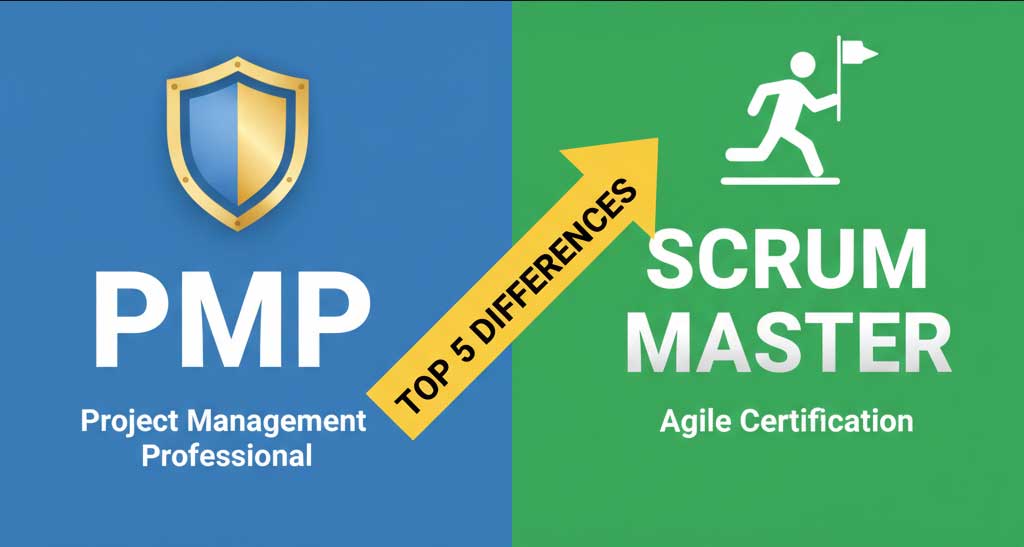Project management has emerged as a highly sought-after profession worldwide. PMP (Project Management Professional) and Scrum Master certifications* have been on the rise just because more and more world-class companies are moving to a structured project execution and Agile methodologies.
Although both strive to improve project management skills, they are geared towards different approaches and career goals. Knowledge of these discrepancies could enable professionals to determine which direction is best fit for them. If you are thinking of applying for a PMP certification or a CAPM certification, understanding the variants is important.
In this piece, we’ll discuss 5 key differences between PMP and Scrum Master certification so you can determine which one is a better fit for your career.
What is PMP, and Scrum Master Certification?
But before doing a comparison, let’s define what each certification is.
PMP Certification
The PMP Certificate, provided by the Project Management Institute (PMI), is internationally renowned. It proves that you can handle projects from planning to execution, monitoring to closure.
Key features include:
- Concentrate on traditional waterfall project management fundamentals.
- Focusing on planning, budgeting, and stakeholder communication.
- Acknowledgements in IT, construction, medicine and finance domain fields.
Having a PMP certification is an indication that you have mastered the project lifecycle and can lead challenging projects effectively.
Scrum Master Certification
Scrum is an Agile methodology applied to software and product development. The Scrum Master guides teams in Agile and removes impediments that slow down projects.
Key features include:
- Emphasize Agile and incremental delivery.
- Practical experience with team-based Sprints, Stand-ups, and Backlog.
- Honor in tech and product development circles.
PMP is more general project management knowledge, while Scrum Master is specific to Agile team facilitation and perfect for quick turnaround, iterative environments.
Difference 1: Project Management Approach
The key difference between PMP and Scrum Master is the methodology:
PMP (Waterfall/Traditional Approach)
- Traditional, predictive with distinct stages: initiation, planning, execution, monitoring, and closure.
- Great for projects with well-defined requirements, and minimal scope changes.
- Extremely documentation, timeline and process control driven.
Scrum Master (Agile Approach)
- Iterative and adaptive process designed to break down massive work into small, manageable sized pieces (or timeframes) completed in short iterations.
- Iterating and adaptability to change.
- Focuses on collaboration, self-organization, and the ability to deliver value.
If you’re in a fast-paced software or product build job, then a Scrum Master certification is good for you. If your business model depends upon structured, linear project flow(s), PMP will be better suited.
Difference 2: Roles and Responsibilities
Both certifications build out your project management toolkit, but the positions for which you’re prepared upon certification are different.
PMP Certification
- Manages projects end-to-end.
- Manages the budget, schedule, risks, and resource allocation.
- Liaises with stakeholders as the prime point of contact to deliverables supporting business objectives.
Scrum Master Certification
- A guide and facilitator to help the team, not rule them.
- Removes obstacles to make the team effective.
- Trains team on Agile concepts and best practices.
In a nutshell, PMP makes you a project manager whereas Scrum Master is about making you a team facilitator.
Difference 3: Eligibility and Prerequisites
Another important difference is the inclusion criteria.
PMP Certification
- Needs 35 hours or more of project management education.
- Those who have completed four-year degrees require 36 months of project-leading experience.
- If you have a high school diploma or an associate degree, then you need 60 months of project experience.
Scrum Master Certification
- Usually does not need previous project management experience, but Agile knowledge is a plus.
- Can be completed in 2–3 days only.
- Great for developers, team members, or anyone getting started with Agile.
CAPM certification is for newbies and a good start to PMP Certifications; Scrum Master is also an approachable entry-level Agile project management certification.
Difference 4: Format of the Exam and The Level Of Difficulty
Format and difficulty of the exam are also quite different.
PMP Exam
- 180 multiple-choice questions based on people, process, and business environment.
- Duration: 230 minutes.
- Needs to have proficiency in PMBOK and hands-on project management experience.
- Generally considered harder due to the depth of the test.
Scrum Master Exam
- Usually between 50 to 80 multiple-choice questions on Agile/Scrum concepts.
- Duration: 60–90 minutes.
- Emphasis is placed on understanding the Scrum framework instead of years of experience.
- Best for beginners and those new to Agile.
So PMP requires more preparation time, Scrum Master less for an exam and quicker upskilling.
Difference 5: Job Chances And Industry Esteem
Lastly, consider the effect of each certification on your job opportunities and industry standing.
PMP Certification
- Known worldwide in IT, medical tech, engineering, and finance communities.
- Unlocks positions such as Project Manager, Program Manager, and Portfolio Manager.
- Because of strict requirements, more likely to come with higher pay.
Scrum Master Certification
- Highly sought after in tech and product fields.
- Leads to titles like Scrum Master, Agile Coach, or Product Owner (plus some other skills).
- Focus on team facilitation, Agile delivery, and leadership in iterative projects.
Which is the best – PMP or Scrum Master?
A comparison of career, project and industry orientation
The right selection between PMP and Scrum Master depends on what you are aiming for in your career as well as which type of projects you’d like to work on.
| Factor | PMP Certification | Scrum Master Certification |
| Methodology | Waterfall/Traditional | Agile/Scrum |
| Scope | End-to-end project management | Team facilitation & iterative delivery |
| Experience Required | 36–60 months | Optional |
| Exam Difficulty | High | Moderate |
| Job Titles | Project Manager, Program Manager | Scrum Master, Agile Coach |
| Industry Focus | IT, construction/real estate, financial services | Tech and software development |
Some practitioners decide to earn both credentials, taking Scrum Master for Agile exposure and then moving on to PMP for wider project management range.
How Courses Help You Prepare
You need structured courses to pass exams and learn useful skills:
PMP Certification Courses
- Include PMBOK best practices, the project lifecycle, and leadership skills.
- Offer simulations, case studies, and mentorship.
- Critical for the challenging PMP exam.
CAPM Certification Courses
- Provide a basic understanding of project management principles.
- Perfect for newbies with very little experience.
- An intermediate waypoint to full PMP certification.
Programs allow you to put your knowledge to work with real-world projects, preparing you for professional success post-test.
Benefits of Earning a Certification
- Career Growth: Employers want to hire and promote workers with certifications.
- Global Recognition: The certifications of PMP and Scrum Master are universally recognized.
- Higher Paying Jobs: You can earn more once you become certified.
- Skills Verification: Proven ability to lead projects and teams.
- Network Capabilities: You can reach out to the PMI or Scrum communities for leverage.
A PMP certification or CAPM certification is well worth the price to pay as it can significantly speed up your career and provide you with many high-paying opportunities.
Conclusion: Choosing the Right Path
PMP and Scrum Master are not competitive; they are complementary.
- PMP: Great for individuals who want to gain foundational, high-level project management skills across all industries.
- Scrum Master: Ideal for professionals with concentration in Agile methodologies and team facilitation in technology-supported settings.
You should select the one that best aligns with your career goals, favorite project management approach, and position in the industry. For many, Scrum Master certification followed by PMP is that blend of Agile exposure and deep project management mastery.
With the proper certification and balanced learning, achieve proficiency, authenticity, and relevance on today’s competitive project management landscape.




